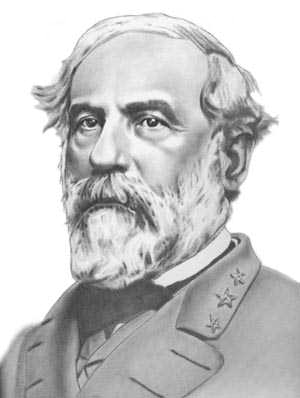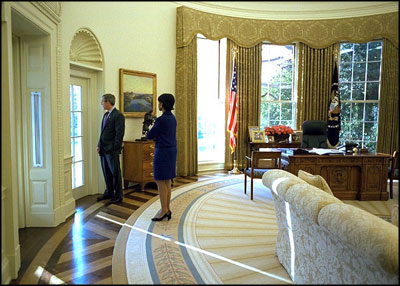|
restoring our biblical and constitutional foundations
|
Mr. President: The Buck Stops With You
President Bush said last Friday “I want to know the facts” about any intelligence failures concerning Saddam Hussein’s alleged cache of forbidden weapons, and today he is calling for an independent investigation. Don’t get too excited, though; it may be another attempt to deflect responsibility. Perhaps the president could learn a lesson from American history.
In July of 1863, General Robert E. Lee unexpectedly found himself engaged with the Federal Army near the town of Gettysburg, Pennsylvania, and had to fight. For three days he tried his utmost to produce one decided simultaneous attack on the whole line, without success. Ewell failed to act with decision. Longstreet and Hill could not be gotten to act in concert. The Federals were able to oppose each of the Confederate Corps, or even divisions, in detail.
Reflecting on the outcome of the battle of Gettysburg, Lee wrote a letter to President Jefferson Davis and asked to be relieved of command of the army. He said:
The general remedy for the want of success in a military commander is his removal. This is natural, and, in many instances, proper. For, no matter what may be the ability of this officer, if he loses the confidence of his troops disaster must sooner or later ensue.
I have been prompted by these reflections more than once since my return from Pennsylvania to propose to Your Excellency the propriety of selecting another commander for this army. I have seen and heard of expression of discontent in the public journals at the result of the expedition…. I therefore, in all sincerity, request Your Excellency to take measures to supply my place. I do this with the more earnestness because no one is more aware than myself of my inability for the duties of my position. I cannot even accomplish what I myself desire. How can I fulfill the expectations of others?
 President Davis, of course, did not see fit to
relieve Lee of command—“Where am I to find that new commander who is to
possess the greater ability which you believe to be required?”
President Davis, of course, did not see fit to
relieve Lee of command—“Where am I to find that new commander who is to
possess the greater ability which you believe to be required?”
After the war Lee commented little on Gettysburg and never went further than to say if the assault had been coordinated success could have been attained. Though many were quick to blame General Longstreet for the disaster in Pennsylvania, Lee himself concluded that it was mainly the absence of Stonewall Jackson, not the presence of Longstreet, that made the Army of Northern Virginia a less than effective fighting force at Gettysburg than at Chancellorsville. One day, while taking a ride with Professor White of Washington College, he said quietly, “If I had had Stonewall Jackson with me, so far as man can see, I should have won the battle of Gettysburg.”
Ultimately, however, Lee blamed no one but himself for the defeat. When he said, “It is all my fault,” he meant it. As Douglas Southall Freeman wrote in his prize-winning biography of Lee, “[Lee] was in command. If his orders were obeyed, the fault was with his plan; if his orders were not obeyed he was culpable for permitting them to be disregarded—so he must have reasoned.”
Let us contrast Lee’s reasoning with the attitude of Bush and Blair on the matter of the alleged Iraqi WMD. On July 10, 2003 in The Times (UK), Simon Jenkins described British Prime Minister Blair’s artful dodging of any responsibility for the WMD fiasco: “Play for time. Delay, bob, weave. Leave the opponent no chink, never retreat, feint, jab, deflect blame, force the enemy into error, deny non-existent accusations with passion. Never apologise. The arts of political spin are as old as Demosthenes. But they have rarely been deployed more effectively than by the present British Prime Minister, as witnessed before the Commons Liaison Committee yesterday.”
He concluded with these words: “The Prime Minister is a legal perfectionist. He will make no Mother of All Apologies. There will be no ‘closure’ on weapons of mass destruction. They will be found in Iraq if Hell has to freeze over first. Mr Blair knows something nobody else knows.”
Last year while in South Africa on an African tour, President Bush
was equally artful in ducking questions over a White
House admission that he used flawed intelligence on Iraq’s nuclear program
while insisting he was right to oust Saddam
 Hussein. Facing reporters for
the first time since the White House admitted he had overstated
Iraq’s alleged efforts to procure uranium, Bush deflected a question on
whether he regretted highlighting the allegation in his January 2003 State of
the Union address.
Hussein. Facing reporters for
the first time since the White House admitted he had overstated
Iraq’s alleged efforts to procure uranium, Bush deflected a question on
whether he regretted highlighting the allegation in his January 2003 State of
the Union address.
“There is no doubt in my mind that Saddam Hussein was a threat to the world peace and there is no doubt in my mind the United States along with our allies and friends did the right thing in removing him from power,” he said. “I am absolutely confident in the decision I made. I’m confident that Saddam Hussein had weapons of mass destruction.”
Where do the top Republican lawmakers stand on Bush’s admission that he used flawed intelligence? They accused opposition Democrats of exploiting a “relatively minor issue.”
How much longer can George W. Bush maintain his denial of responsibility? While President Kennedy took personal responsibility for the Bay of Pigs disaster, even though he easily could have blamed the mess on his predecessor or on the intelligence community, it seems unlikely that Bush will ever assume responsibility for the intelligence fiasco prior to invading Iraq, independent investigation or not.
It’s high time that someone in this country remembers that the buck stops with the Commander in Chief.
February 2, 2004
David Alan Black is the editor of www.daveblackonline.com.